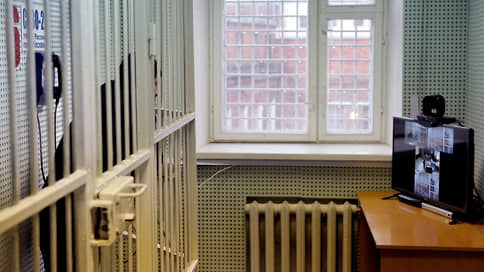The Ministry of Justice proposes to allow absentee meetings between prisoners and lawyers in pre-trial detention centers
[ad_1]

Meetings between prisoners and lawyers in pre-trial detention centers should take place not only in person, but also using video conferencing (VCC), suggests the Ministry of Justice of the Russian Federation. The agency refers to the negative experience of the coronavirus pandemic, when in-person visits were hampered by sanitary restrictions. However, experts interviewed by Kommersant claim that the main problem is the lack of premises for visits in a number of pre-trial detention centers. Because of this, lawyers have to stand in lines for many hours even without a pandemic. Video communication could solve these problems, experts admit, but they believe that the Ministry of Justice’s proposal needs to be improved.
The Ministry of Justice has published draft amendments to the law “On the detention of suspects and accused of committing crimes” and the Code of Criminal Procedure. In its explanatory notes, the department reminds that according to the law, meetings between lawyers and clients are held “privately and confidentially, without limiting their number and duration.” But during the coronavirus pandemic, special regimes for visiting detention centers were introduced, “complicating the rights of suspects and accused persons to legal assistance.” Then the FSIN received more than 70 complaints regarding problems with dating, the Ministry of Justice complains.
Therefore, the department wants to conduct visits in the pre-trial detention center not only in person, but also “via video conferencing at the request of the suspect or accused.” “The organization of these visits will be provided by equipping on the territory of the pre-trial detention centers separate offices for the defense lawyer and an office for the suspect or accused,” the explanatory note says. “The specified premises will be equipped with two-way video communication to ensure the confidentiality of negotiations.” However, the Ministry of Justice stipulates that it is also permissible to “use the existing offices of investigators and lawyers.” Public discussion of the initiative will last until September 28.
Experts interviewed by Kommersant recall that in a number of regions it was difficult for lawyers to meet with arrested clients both before the pandemic and after it. The problem is the lack of premises for visits, so lawyers have to wait in long lines in pre-trial detention centers. Member of the Presidential Council for Human Rights Eva Merkacheva says that in the capital’s pre-trial detention centers, even through the electronic recording system, “it is impossible to make an appointment for the next two weeks.” Executive Secretary of the Moscow Public Monitoring Commission Alexey Melnikov talks about the capital’s Lefortovo: “If you arrive early in the morning, you can only get there late in the evening.” However, he stipulates that the problem with access to pre-trial detention centers for lawyers is “not in all regions.”
Ms. Merkacheva participated in the preliminary discussion of the initiative at the Ministry of Justice. “The idea was that the lawyer often needs to talk with the client for just a minute – for example, to inform him of the date of the next court hearing,” she says. According to Mr. Melnikov, up to 80% of a lawyer’s work in a pre-trial detention center does not require confidential communication, since it relates to the discussion of everyday issues, such as conditions of detention. “This does not require a long stay in queues,” the expert adds. But he calls for assessing in advance whether the new format will “overwhelm” the FSIN employees, paying attention to their understaffing and shortfall “in a significant number of institutions.”
“The problem of queues in pre-trial detention centers is relevant. If the equipment makes it possible to speed up the meeting with the principal, albeit in the video conferencing format, this may be in demand. If today the practice of remote participation of accused persons from pre-trial detention centers in court proceedings has become commonplace, why not provide such an opportunity to communicate with defense attorneys,” argues the managing partner of the Pen & Paper bar association, Alexey Dobrynin. He, however, calls for using the format “not instead of, but along with the possibility of traditional live communication.” Ms. Merkacheva also considers it important that video communication “does not replace real meetings.”
However, lawyer Andrei Suchkov doubts that the Ministry of Justice bill in its current form will solve the problem of queues. “The “explanation” states that the HQS office for the accused and the HQS office for the lawyer should be located in the same pre-trial detention center. And this completely kills the whole point of the idea,” he told the publication “Advokatskaya Street” (in the register of foreign agents). “Because again you will need to go to the isolation ward and stand in line – this time to get into the offices for the high-confidence specialists. Moreover, I am not sure that new offices will be created for the HQS, since the area of the pre-trial detention center is limited. This means they will be converted from existing premises.” According to Mr. Suchkov, in some regions, bar chambers have already agreed with the regional departments of the Federal Penitentiary Service on a system of videoconferencing visits. But there was one computer in the detention center, and the other in the chamber of lawyers, so the lawyers did not have to wait in lines at the pre-trial detention center. The Ministry of Justice’s bill could “jeopardize regional projects,” the lawyer worries, “because formally they do not comply with the proposed amendments.”
[ad_2]
Source link








